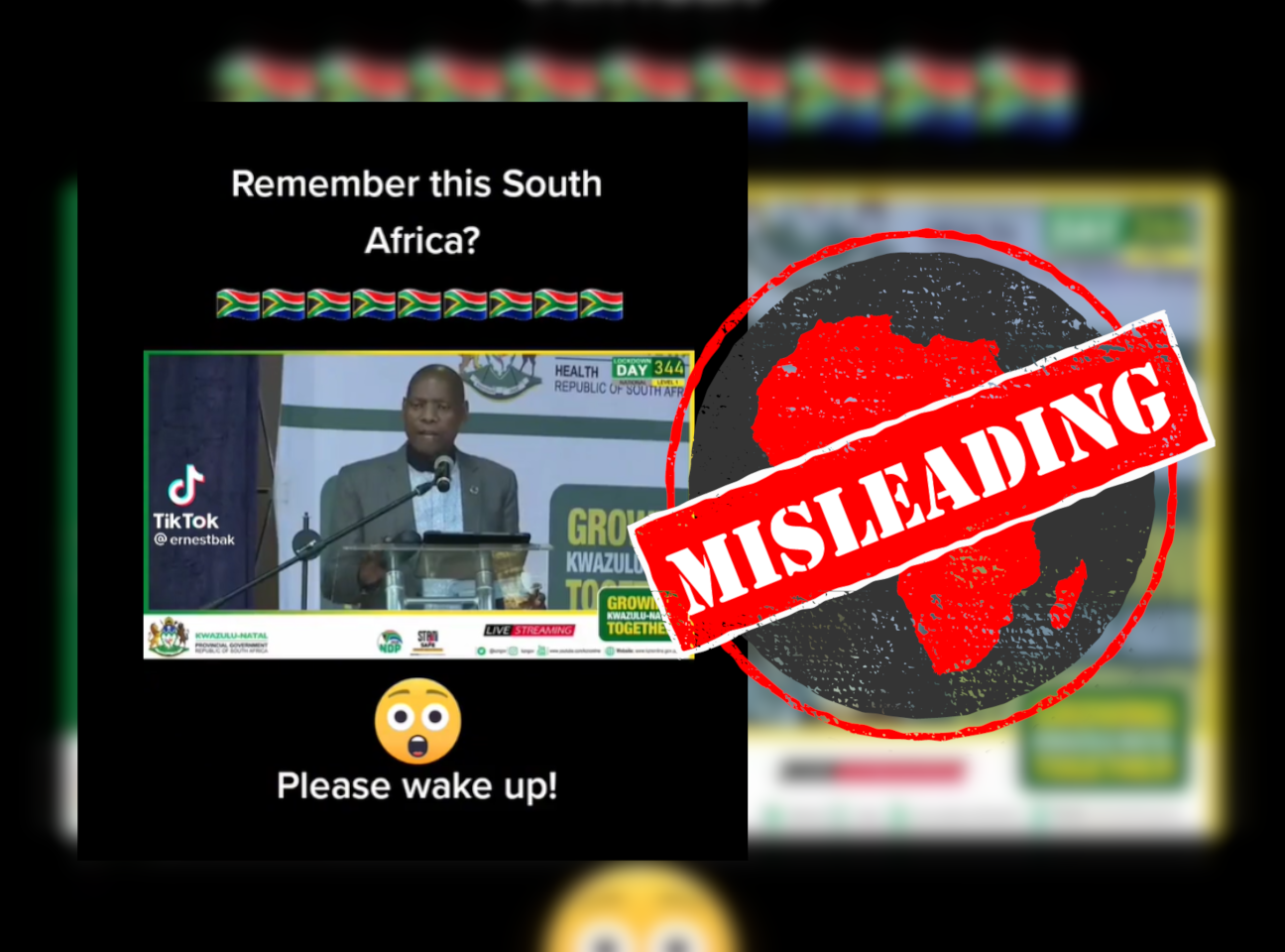A TikTok video widely shared on Facebook in September 2021 shows former South African health minister Dr Zwelini Mkhize talking about Covid-19 vaccines.
In the clip, Mkhize says the country has acquired a number of vaccines. But he adds that “the only way South Africa could access these vaccines was to register an implementation trial, which in this case doesn’t actually deal with issues of safety and efficacy”.
Text above and below the clip reads: “Remember this South Africa? Please wake up!”
One TikTok user who reacted to the video captioned it “#guinea pig SA”. But were people in South Africa really test subjects for Covid vaccines?
No. The clip has been taken out of its context.

Voluntary Sisonke study allowed healthcare workers to get vaccine
The 34-second clip is taken from a much longer live stream of an event on 5 March 2021 to mark a year since South Africa’s first Covid case was confirmed. Mkhize speaks for almost 45 minutes. The event was at Pietermaritzburg Grey’s Hospital, where the first case was detected in March 2020.
Mkhize is referring to the Sisonke study, which was not a trial. The study allowed healthcare workers to get the Johnson & Johnson Covid-19 vaccine before it had been given full approval for use in South Africa. It was entirely voluntary, and approved by the South African Health Products Regulatory Authority (Sahpra).
The vaccine had already undergone rigorous clinical trials to demonstrate its safety and efficacy.
The Sisonke study was only available to healthcare workers, and Mkhize was mostly correct to say that it wasn’t meant to investigate “issues of safety and efficacy”. The study’s primary aim was to investigate the effectiveness of the vaccine in protecting healthcare workers from Covid-19.
Another objective was to estimate how likely it was that healthcare workers would choose to be vaccinated. Sisonke also looked at the genetic diversity of the coronavirus in “breakthrough” Covid-19 cases – cases of the disease in vaccinated people. This was to see if a particular variant of the virus that causes Covid-19 was especially resistant to the vaccine.
Results from the Sisonke study have so far shown that the vaccine was effective at protecting healthcare workers from infection, severe illness and death from Covid-19. The vaccine also offered reliable protection against several genetic variants of the virus.
Johnson & Johnson trial shows effectiveness and safety
Johnson & Johnson released the results of its first phase 3 clinical trial in January 2021.
The multi-country trial found that in nearly 50,000 volunteer participants, the vaccine “was 66% effective overall in preventing moderate to severe Covid-19, 28 days after vaccination”. It was even more effective at protecting against severe illness and death.
The trial also reported no safety concerns. It added that the control group, who didn’t get the vaccine, reported more severe adverse reactions than participants who actually did get the vaccine. Further trials, including real-world evidence from ordinary people who have been vaccinated, confirm that the vaccine is safe and effective.
The Johnson & Johnson vaccine has since been made available to the public, but only after being granted full approval by Sahpra.
The short TikTok clip takes Mkhize’s statements completely out of context. It starts as he is in the middle of a sentence, and cuts out while he is halfway through a word. And it doesn’t allow him to explain the Sisonke study at all.
Videos like this should always be treated with suspicion.
Republish our content for free
For publishers: what to do if your post is rated false
A fact-checker has rated your Facebook or Instagram post as “false”, “altered”, “partly false” or “missing context”. This could have serious consequences. What do you do?
Click on our guide for the steps you should follow.
Publishers guideAfrica Check teams up with Facebook
Africa Check is a partner in Meta's third-party fact-checking programme to help stop the spread of false information on social media.
The content we rate as “false” will be downgraded on Facebook and Instagram. This means fewer people will see it.
You can also help identify false information on Facebook. This guide explains how.


Add new comment